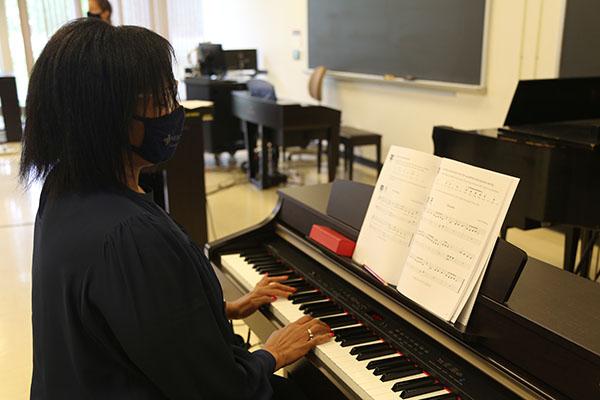Music and humans go together.
We intuitively use music to adjust our feelings and emotions. We use it to soothe, cheer, and express ourselves. After all the years of humans making music, we should know all there is to know about that relationship, but we don’t.

Researcher Meggie Young, associate professor of music, is investigating whether learning to play the piano together can improve your quality of life and well-being.
“What we don’t know is how various types of music engagement impact one’s quality of life,” Young said. “I’m hoping to see if there’s a difference between in person and online group participatory music experiences.”
To study the question, Young recruited a class of novice and would-be piano players as research subjects. The players met once a week either online or in-person in the campus piano lab for lessons for five weeks. Young surveyed their feelings of wellbeing both before and after and will analyze the results.
Beyond generating research data, Young wants the piano players to enjoy their new skill.
“I hope participants come away from the project with the confidence to learn other piano music,” Young said. “If they felt better after playing the piano, then that’s awesome. But really, I want students to know that they can be creative or expressive through the piano.”
The research subjects came from both campus and the community and were happy to trade their time and experiences for the chance to take lessons with Young.
Admissions Manager Georgia Bass has an undergraduate degree in music and theatre, but never learned to play the piano. When the notice of Young’s research study went out to the campus, Bass seized the opportunity.
“I wanted to do something for myself on my lunch break and reconnect with a passion that I don't get to spend much time on in the real world,” Bass said.
She will sign up for the project the next time it is offered and has already recommended it to others on campus. The idea that her efforts will help broaden our understanding of a topic is appealing.
“I like feeling part of something bigger, led by accomplished researchers,” Bass said.
Diversity and Inclusion Manager Temple Patton also likes the idea of contributing to the knowledge base. She joined the study in the hopes of brushing up on the piano skills she picked up as a child.
“I played piano for four years as a young kid. I have missed it and wanted to learn to play again,” Patton said. “The experience was fun, and gave me something to look forward to each week. Meggie Young is a phenomenal teacher.”
Patton doesn’t have a piano at home so she will be a prime candidate for the next round of the study.
Young will be offering an online cohort for adults in autumn 2021. If you are interested in participating, contact her at young.1661@osu.edu.
# # #
Photo caption: Temple Patton plays one of the pianos in the temporary piano lab in Reed Hall.
